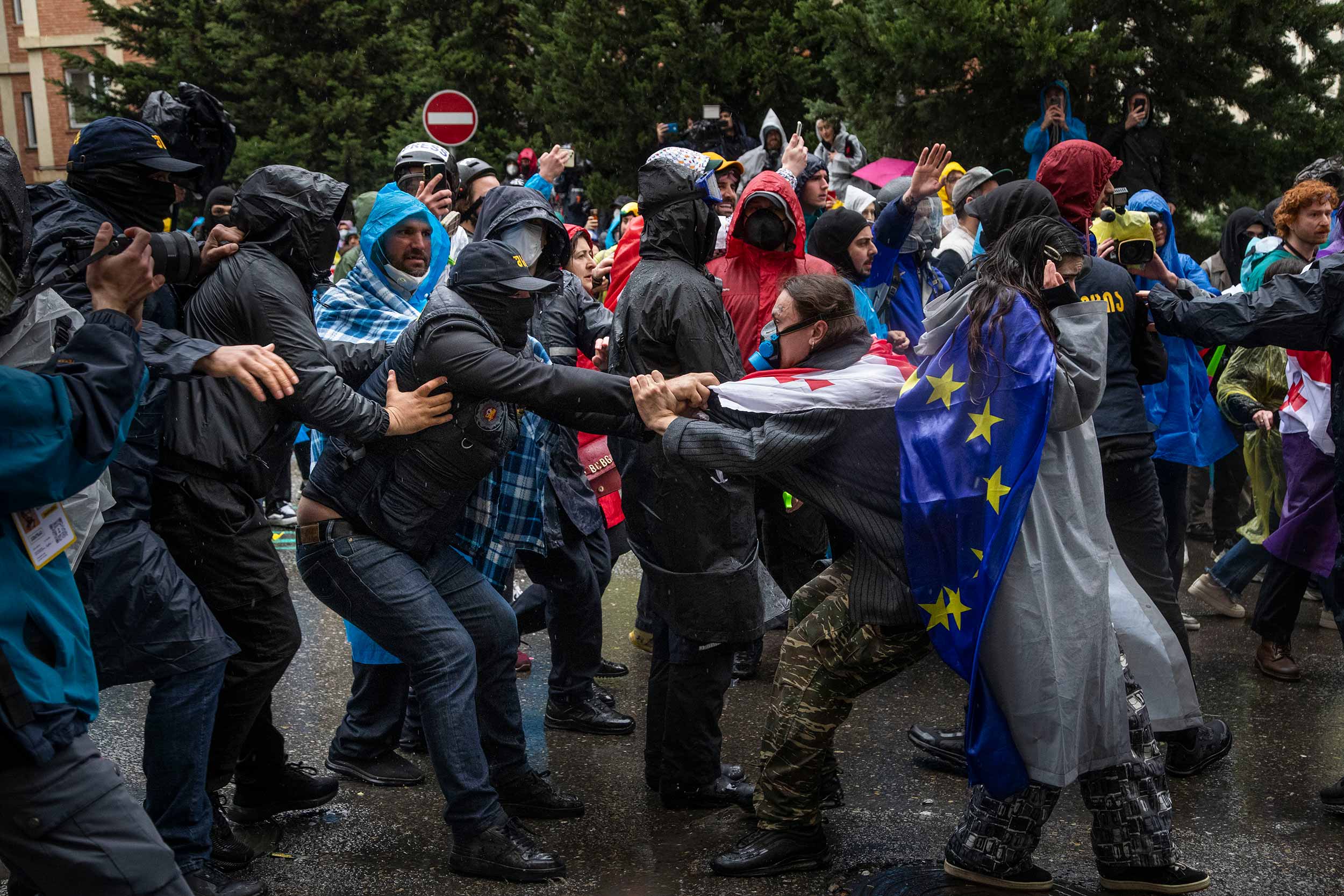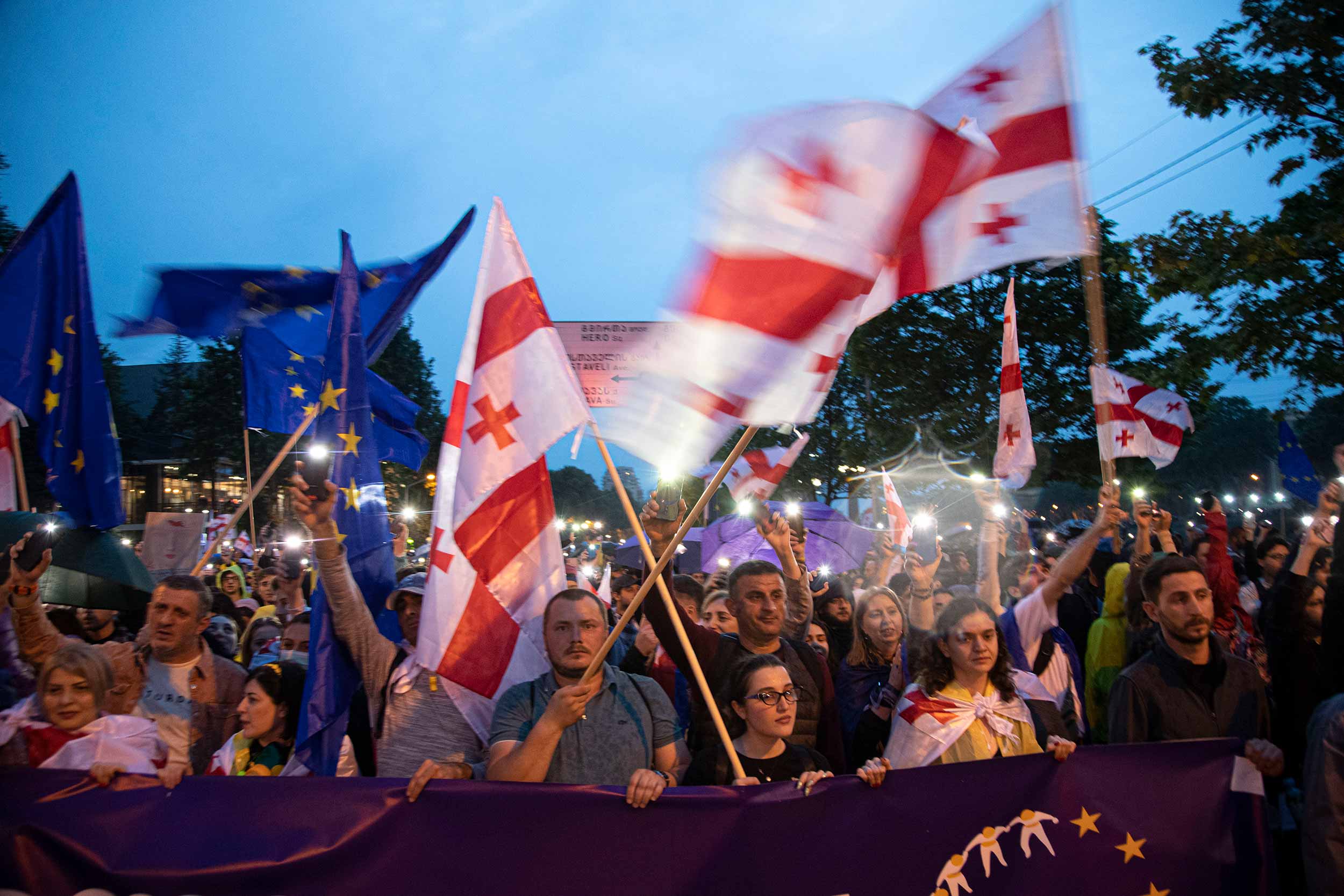Georgia: Anger Soars Over “Foreign Agents” Law
The new legislation leaves the country on the verge of civil confrontation and international isolation.
Civil society groups have vowed to continue battling for the withdrawal of Georgia’s highly controversial “foreign agent” law, passed earlier this week amid clashes both inside and outside parliament.
The new legislation leaves Georgia on the verge of civil confrontation and international isolation, with protestors warning that it threatens to muzzle civil society and throw Georgia off its path to integration with the EU.
A heavily guarded parliament building was engulfed by crowds of protesters on May 14 when the bill was put to the final vote. The governing Georgian Dream (GD) party pushed the bill through the legislative floor despite fervent objections from the opposition and brawls repeatedly erupting in the assembly hall. A massive police force was also deployed in the centre of Tbilisi to quell the crowds of protesting the law as a step toward authoritarianism.
Labelling the legislation the “Russian Law,” opponents insist that the GD government is trying to emulate the Kremlin’s repressive tactics.

“This law is a Russian authoritarian tool of supressing freedom of speech,” almost 500 NGOs and media organisations said in a collective statement. Moscow has used similar legislation as a basis for cracking down on civil society and free media.
“The law undermines independent observation of democratic process,” said Tamara Sartania, an election consultant. “GD already controls most public institutions, including the judiciary and the election administration, and it is now trying to eliminate independent watchdogs.”
Formally known as the Law on Transparency of Foreign Influence, the legislation requires all non-profit groups and media organisations that source more than 20 per cent of their income abroad to register as entities serving foreign interests.
The label will be applied to virtually all of Georgia’s democracy watchdogs, human rights advocacy groups, development organisations and critical media, as the overwhelming majority are funded by international donors.
“Credible organisations are facing threats and harassment."
GD has argued that the law aims to bring more transparency to the inflow of foreign funding, but critics are convinced that its purpose is actually to stigmatise civil society groups and critical media as foreign spies and thus subvert their work.

“Even the organisations that provide services to vulnerable groups become labelled as servants of foreign interests,” said Zurab Tatanashvili, a coordinator with the Centre for Strategic Research and Development for Georgia, a body that helps support marginalised groups including the elderly and people with special needs.
“This puts at risk assistance from international partners, local service providers’ collaboration with the authorities and the very services that we provide,” Tatanashvili continued. “The work, which is meant to help our country and servers our country’s interests, is being declared as something that is forced upon us by foreign forces.”
Civil society representatives say that the problem is not just with the law, but also with the government’s hostile rhetoric toward civil society.
“Credible organisations are facing threats and harassment from the government,” said Sartania.
Parallel to initiating the law, party officials launched an aggressive campaign against the country’s vibrant civil society, accusing NGOs of attempts to destabilise Georgia on the orders of Western forces. Its billionaire founder Bidzina Ivanishvili has spoken of a supposed conspiracy in the West to use NGOs to overthrow the Georgian government.
“The laws that we are proposing are meant to expose these dark connections,” Ivanishvili said in a public address on April 29. Government officials, all Ivanishvili loyalists, have repeated that charge.
Such rhetoric and the passing of the law has put an unprecedented strain on Georgia’s relations with its Western partners.
“We were very clear: adoption of this law is moving Georgia away from its stated objective to get closer to the European Union,” said Peter Stano, the European Commission’s spokesperson for foreign affairs.
The EU also condemned the use of force against the peaceful protesters who have been rallying against the law in the streets of Tbilisi for weeks, as did the US, warning that the law and the Georgian government’s hostile rhetoric has jeopardised the friendship between Washington and Tbilisi.
“Some of the recent speeches here and the actions of the parliament make us wonder if our strategic interests are shared by the government,” US assistant secretary of state Jim O’Brien said during his May 14 visit to Georgia. He hinted that Washington might respond with economic and travel sanctions.
Meanwhile, campaigners have promised to persist lobbying for the law to be overturned. Protests, often led by students and young people, appear to be continuing..
“The situation is not too promising, given how aggressive and violent the government’s actions have been,” Tatanashvili said. “[But] we will keep resisting. There is still hope that this situation can be reversed.”
